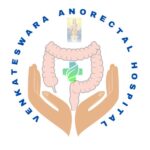Pilonidal Sinus

Pilonidal sinus is a condition characterized by the development of a small tunnel or tract in the skin near the tailbone (coccyx). This tract usually contains hair, debris, and pus, and it can cause discomfort and pain. Here’s an overview of the causes and symptoms:
Causes:
Hair penetration: One of the primary causes of pilonidal sinus is hair penetration into the skin near the coccyx. This can occur due to friction or pressure on the area, causing hair to enter the skin and trigger an inflammatory response.
Friction and pressure: Activities that involve prolonged sitting or rubbing of the coccyx area, such as sitting for long hours, cycling, or driving, can increase the risk of developing pilonidal sinus.
Poor hygiene: Inadequate hygiene practices, such as infrequent washing or cleaning of the coccyx area, can contribute to the accumulation of dirt, sweat, and bacteria, increasing the likelihood of pilonidal sinus formation.
Genetic predisposition: Some individuals may have a genetic predisposition to developing pilonidal sinus, making them more susceptible to the condition.
Symptoms:
Pain and tenderness: The most common symptom of pilonidal sinus is pain and tenderness in the area near the tailbone. This pain may worsen with pressure or movement and can range from mild to severe.
Swelling and redness: Pilonidal sinus often causes swelling and redness in the skin overlying the affected area. The skin may feel warm to the touch and appear inflamed.
Drainage of pus or blood: In some cases, the pilonidal sinus may discharge pus, blood, or a foul-smelling fluid. This drainage may occur spontaneously or with pressure on the area.
Formation of abscess: Pilonidal sinus can lead to the formation of an abscess, which is a collection of pus within the sinus tract. Abscesses can cause increased pain, swelling, and tenderness in the affected area.
Fever and malaise: In severe cases of pilonidal sinus or when an abscess develops, individuals may experience systemic symptoms such as fever, chills, and general malaise.
Recurrent infections: Pilonidal sinus is prone to recurrent infections, with symptoms worsening during episodes of flare-up.
What we do for pilonidal sinus in Venkateswara ano rectal hospital ?
We provide comprehensive treatment for pilonidal sinus, a surgically treatable disease. Our treatment options include:
- Laser Ablation
- Kshara Sutra Trans fixation
We also offer other techniques such as:
- Excision of sinus and Kshara Karma
- Z-plasty
- VY-plasty
Despite the availability of various treatments, there is a high rate of recurrence with traditional methods. However, Venkateswara Ano Rectal Hospital has developed new methods for pilonidal sinus treatment, which significantly reduce the chance of recurrence to negligible levels.

